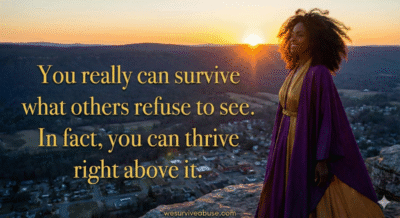When Survivors hear “I’m sorry,” it can stir hope. How could it not? There's love or at least caring there. But apologies from abusers
When Survivors hear “I’m sorry,” it can stir hope. How could it not? There's love or at least caring there. But apologies from abusers
When Survivors hear “I’m sorry,” it can stir hope. How could it not? There’s love or at least caring there.
But apologies from abusers are often tangled with manipulation, pressure, or empty promises. Real remorse looks different from regret at being caught.
Here are signs to watch for:
No more “I was stressed” or “You made me angry.”
True remorse accepts full responsibility.
Abusers who demand instant forgiveness are still focused on themselves.
Real remorse respects your timeline, not theirs.
Consistent change is visible over time.
They follow through without needing reminders or rewards.
Real remorse motivates them to enter counseling, accountability groups, or treatment on their own.
It’s not about appeasing you; it’s about transforming themselves.
“God forgave me, so you should too.”
“The therapist says I’m better now.”
Real remorse doesn’t twist healing tools into pressure tactics.
No guilt-tripping when you need space.
No violating your boundaries under the disguise of “love.”
Real remorse honors the safety you ask for.
Regret focuses on “I lost my job” or “people are mad at me.”
Remorse focuses on: “I harmed you. I broke trust. I created fear.”
No more pointing fingers at your reactions, your family, or their childhood.
Real remorse says, “It was me. I chose to harm. I need to change.”
They don’t expect applause for small steps.
They don’t rush you to declare them “changed.”
Real remorse is steady, humble, and quiet.
Real remorse doesn’t expire after six months of good behavior.
They accept that they’ll always need to be accountable for the harm they caused.
A quick apology is easy. Sustained change is rare—and that’s where real remorse lives. As Survivors, we deserve more than rehearsed lines and short-term performances. We deserve safety, dignity, and proof over time.
In kind-the community, the family, the faith community- does not throw these things into the faces of others. They allow time. They allow people to make their own decisions. The decisions that honor them and their health and well-being.